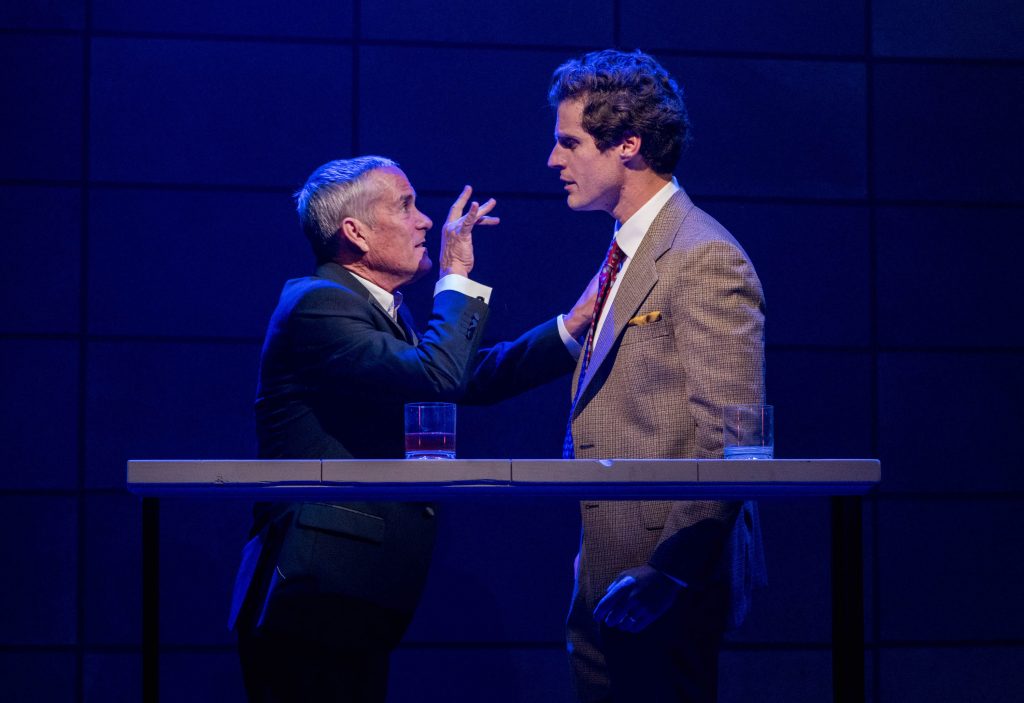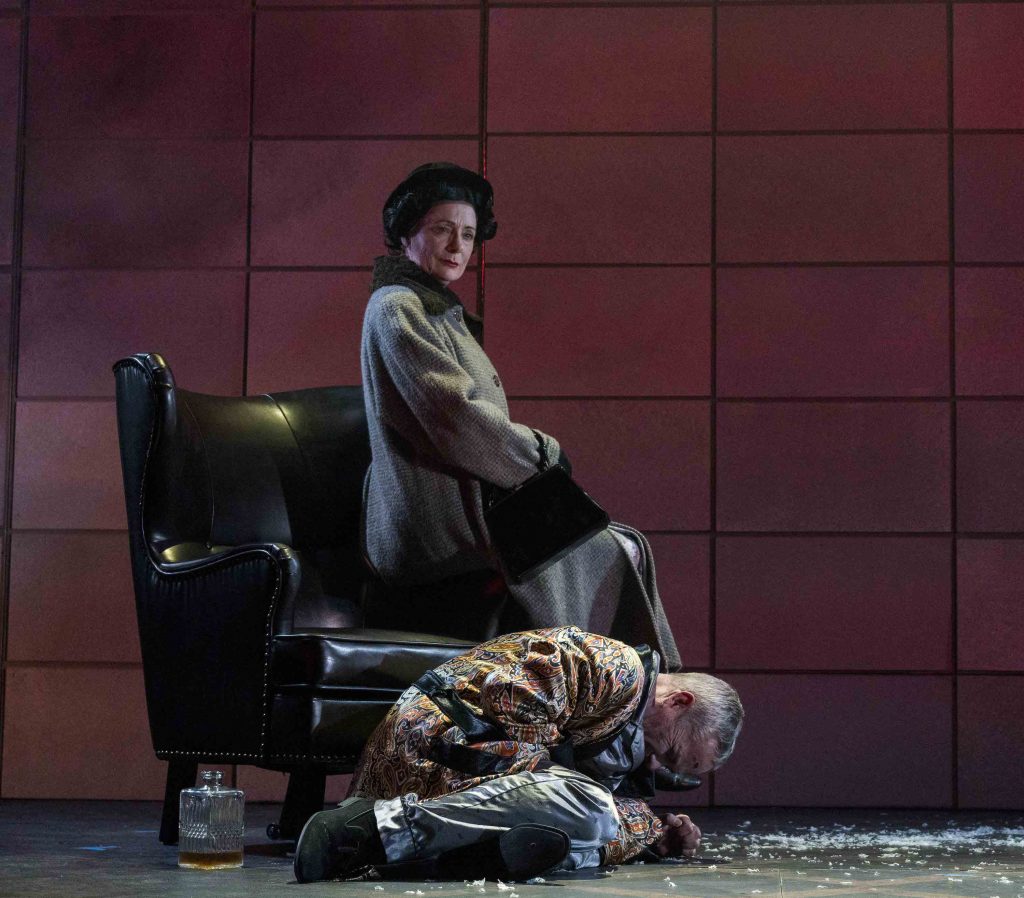Kushner’s “Angels in America” Part One Lands Impressively at Cygnet Theatre
It has been some 25 years since Tony Kushner’s award winning play Angels in America: A Gay Fantasia on National Themes opened on the stage. Since that startling, groundbreaking opening, the diagnosis of AIDS has ceased to be a death sentence, and the U. S. Supreme Court has legalized same-sex marriage. And a protégé of the closeted gay lawyer Roy Cohn–Kushner’s axis of human evil–is now President of the U.S.A.!

James Newcomb & Connor Sullivan [photo by Daren Scott]
Neatly summarizing the plot of Kushner’s Angels is as daunting as boiling down the drama of Wagner’s Ring Cycle into a pair of neatly balanced sentences. Over two long but brilliantly constructed plays set in the heart of the Ronald Reagan era, Kushner follows the unlikely intertwining of two dangerously flawed relationships: AIDS patient Prior Walter and his frightened lover Louis Ironson and the closeted Mormon lawyer Joe Pitt—a disciple of Roy Cohn—and his pill-addicted wife Harper. Kushner’s characters are visited and attended by various angels as well as a rabbi, a nurse, and the ghost of Ethel Rosenberg. Cohn and Rosenberg are the only two historical persons in these plays, but most of the others are definitely of the period.

Rosina Reynolds & James Newcomb [photo (c.) Daren Scott]
In a later scene with Sullivan, Newcomb earnestly confected his simulacrum of charm to persuade this up-and-coming lawyer to move to Washington D.C. and use the cover of his Utah Mormon innocence to reinstate the sullied Cohn with the august tribunals of the legal profession.
Spouting and choreographing her eerie hallucinations, Rachel VanWormer brought equal electricity to Harper Pitt, splicing spot-on accusations of her husband’s not so closeted behavior into these anguished soliloquies. Sullivan made his Joe Pitt a striver with that puppy dog need for uncomplicated affirmation; his drunken phone confessional to his mother in Salt Lake City, icily played by Rosina Reynolds, broke his character’s carefully constructed mask none too gracefully.
Portraying a reproving mother of her straying adult son is no doubt something Rosina Reynolds can comfortably accomplish only half-awake before her first cup of morning coffee. But her deft and convincing delivery of Kushner’s Orthodox rabbi giving a eulogy for an elderly Jewish woman from a New York retirement home he had never met displayed Reynolds’ ample prowess. Mysteriously appearing before the railing but now terminal Roy Cohn, Reynolds’ marvelously composed Ethel Rosenberg judiciously masked–but not entirely–her revenge on the man who illegally lobbied the judge to send her to the electric chair
The danger of playing Prior Walter is turning him into a martyr, which Alex Bodine avoided by projecting a modest stoicism concerning his devolving state. Wil Bethmann took on Louis, the lover who leaves Walter, but Bethmann made me believe his character did this not out of fear of contracting Walter’s disease, but out of his overwhelming fear of the unknown. I saw in his Louis a young gay man who looked into the abyss of life with AIDS, but turned away and tried to escape back into the dark corners and back rooms of pre-AIDS urban America.

Alex Bodine & Kevane La’Marr Coleman [photo (c.) Daren Scott]
This production of “Millennium Approaches” clocked in at three hours and twenty minutes, but Murray’s pacing wasted few seconds. More importantly, the complex play’s energy level never faltered. Designer Andrew Hull’s massive geometric wall at the back of the stage clearly stood for the grandeur of Kushner’s aspirations, and on a more practical level helped ground the short scenes that whisked by in front of it. And on occasion, a small segment of the wall turned into a magical door through which an unexpected personage entered the action. Apt but modestly proportioned props, with the exception of a sizable bed for Walter and Louis, were quickly wheeled in and out, sometimes while Blake McCarty’s abstract linear projections unfurled across the wall. The whole package proved compact and seamless, a virtue on Cygnet’s tiny thrust stage that always invites the audience into the heart of its action.
Shirley Pierson’s costumes cleanly denoted the 1980s, when casual tended to be overly comfortable and forgettable but dressy adhered to classic standards, e.g. the black-suited Cohn and his Republican politicos and Joe Pitt’s Burberry camel overcoat. Ethel Rosenberg’s dressy outfit with the proper small hat, of course, came straight from a 1951 Vogue magazine spread. Steven Leffue’s sound design provided ominous thundering when an angel did or might appear, and he spliced in some Baroque trumpet fanfares here and there for special emphasis. His less was ample more.
Tony Kushner’s “Angels in America” Part One “Millennium Approaches” was staged by Cygnet Theatre in the Theater in Old Town, 4040 Twiggs St., San Diego. Opening night, March 9, 2019, was attended for this review. Part Two “Perestroika” opens in the same venue on March 24, after which the plays continue in repertory through April 20.

Ken Herman, a classically trained pianist and organist, has covered music for the San Diego Union, the Los Angeles Times’ San Diego Edition, and for sandiego.com. He has won numerous awards, including first place for Live Performance and Opera Reviews in the 2017, the 2018, and the 2019 Excellence in Journalism Awards competition held by the San Diego Press Club. A Chicago native, he came to San Diego to pursue a graduate degree and stayed.Read more…
